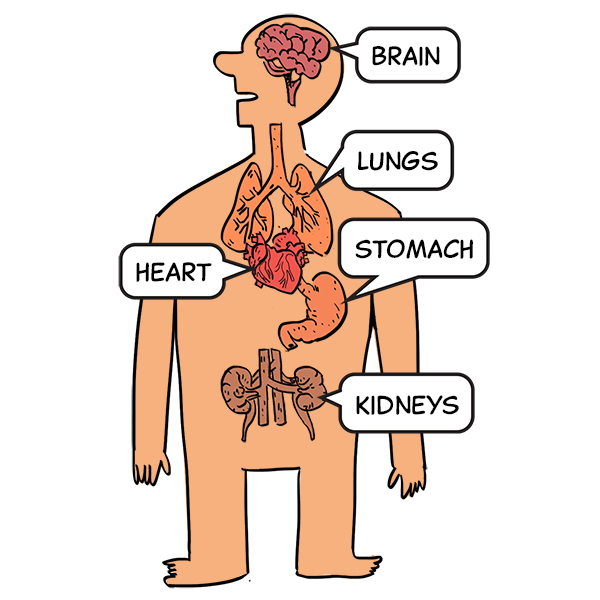An Amazing Machine!
Right now, energy from the breakfast you ate is powering your brain. Your brain is focusing on these words and telling your hand when to scroll down the page. Your hand’s muscles need oxygen to do this, and your heart is working non-stop to send oxygen to your hand and brain.
Don’t forget about your lungs that get oxygen, your stomach that digested your food, your intestines that sucked up nutrients, and all the other parts of your body that are working just so you can read this!
Your body is truly like a busy city where everyone has a job to do. And guess what? All these things happen in tiny little building blocks called cells. Let’s meet some of them!
Meet the Parts of Your Body
- Cells, Tissues, and Organs – The Tiny Builders: Cells are like tiny workers that do lots of jobs to keep you healthy. They group together to make tissues, and tissues group together to make organs. For example, muscle cells join together to form muscle tissue, which makes up organs like your heart.
- The Heart – The Mighty Pump: Your heart is about the size of your fist and it’s like a pump that sends blood all around your body. This gives every cell the stuff they need to work properly. Your heart beats around 100,000 times each day!
- The Immune System – The Body’s Defenders: The immune system is like your body’s team of superheroes. They fight off bad guys like germs that can make you sick. White blood cells are the superheroes of this team, always ready to fight any threats they find.
- The Brain – The Boss: Your brain is like the boss of your body. It controls everything from your thoughts and feelings to how you move and even how your body works. Your brain can process information super fast, so you can react quickly to what’s happening around you.
- The Spinal Cord – The Messenger: Your spinal cord is a long bundle of nerves running down your back. It’s like a super-fast messenger that carries signals between your brain and the rest of your body.
- The Lungs – The Air Suppliers: Your lungs are like air suppliers. They give oxygen to your blood and take away a waste product called carbon dioxide. When you take a deep breath, your lungs fill with air, and tiny bags inside them take out the oxygen and put it into your blood.
- The Stomach and Intestines – The Food Processors: Your stomach and intestines are like food processors. They break down the food you eat into nutrients that your body can use for energy, growth, and repair.
- The Kidneys – The Clean-up Crew: Your kidneys are like your body’s clean-up crew. They filter out waste products from your blood and control how much fluid is in your body. The waste is turned into pee, which then leaves your body.
- The Endocrine System – The Message Makers: The endocrine system is like your body’s message-making service. It’s made up of glands that produce hormones, which are like chemical messages that control lots of things in your body.
Let’s Appreciate Our Amazing Bodies!
Isn’t it amazing to think about all the things your body does without you even noticing? From fighting off germs to processing food, each part of your body has an important job to do. So, let’s remember to take care of our bodies by eating healthy, getting plenty of sleep, and staying active. Your body is truly an amazing machine!
